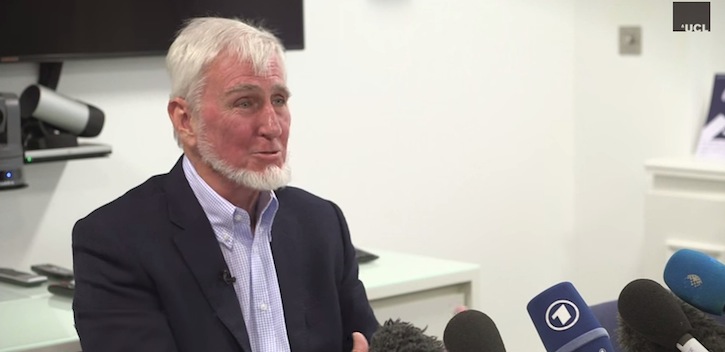2014 Press Releases
Honorary Doctorate for Nobel Laureate Professor John O’Keefe

Nobel Prize winner Professor John O’Keefe will visit UCC on 15 December as he returns from Nobel Week, where he will receive an Honorary Doctorate and deliver a lecture at a major neuroscience symposium.
Professor John O’Keefe, who is based out of University College London, was recently jointly awarded the 2014 Nobel Prize in Physiology or Medicine with Norwegian neuroscientists May-Britt Moser and Edvard Moser, for discovering an ‘inner GPS’ that helps the brain to navigate. UCC is in turn recognising Professor O’Keefe with an Honorary Degree of Doctor of Science (DSc) on Monday 15 December, which UCC President Dr Michael Murphy commented is in recognition of his ground-breaking contributions to neuroscience.
Great to see the Nobel go to hippocampus-our O'Keefe Symposium/Hon Conferring @UCC in Dec will be extra special pic.twitter.com/ylpKVeRCZl
— John F. Cryan (@jfcryan)
October 6, 2014
Professor O’Keefe is the third recipient of an honorary doctorate from UCC who is also a Nobel Laureate; the other recipients being DNA pioneer Dr James Watson in 2010 and Dr Robert Wilson in 2004.
UCC to honour Nobel Laureate http://t.co/uoKY5iRpY1
— The Irish Times (@IrishTimes)
October 7, 2014
Professor O’Keefe, whose father hailed from Newmarket (Scarteen Lower), Co. Cork, and whose mother from Co. Mayo (Breaffy) in Ireland, will deliver the main lecture at a UCC symposium that also features a number of other renowned Irish neuroscientists. ‘The Hippocampus in Health & Disease’ is organised by Science Foundation Ireland-funded Investigators Dr Yvonne Nolan and Professor John F. Cryan of UCC’s Department of Anatomy and Neuroscience.
Congrats to Prof John O'Keefe on his @nobelprize Win - also to receive UCC Honorary Doctorate - via @IrishCentral http://t.co/ejaVViGiJS
— UCC Ireland (@UCC)
October 6, 2014
“The symposium will highlight how recent discoveries informs us on how the hippocampus is critical for learning and memory, which has implications for Alzheimer’s disease, aging, epilepsy and stress-related psychiatric disorders," says Professor Cryan, who is also Professor O’Keefe’s introducer at the Honorary Conferring. Professor O’Keefe will deliver a lecture entitled ‘The Hippocampus as a Cognitive Map: an update’ which will focus on his seminal contributions to cognitive neuroscience.
Professor with Irish roots wins Nobel for medicine and is due to receive an honorary doctorate from UCC http://t.co/KZcy3qt2V9
— UCC International (@UCCInt)
October 7, 2014
Dr Nolan comments: “We would like to acknowledge Science Foundation Ireland who support our current Investigator Award for research on the hippocampus. The importance of this research area is exemplified by the award of theNobel committee to Professor O’Keefe, who we are honoured to have here in Cork.”
The Honorary Conferring ceremony will be live-steamed via http://www.ucc.ie/en/live/
UCC's annual Honorary Conferring ceremony recognises individuals who have distinguished themselves nationally or internationally, through their scholarship, creativity, public service or contribution to social, cultural, academic, scientific, sporting or economic life.
For further information on the symposium, which takes place in UCC’s Western Gateway Building, including the full schedule, please see http://www.ucc.ie/en/hippocampus/
In 2015, University College Cork celebrates another genius besides Professor John O’Keefe, with the bicentenary of George Boole, 1815-64. Born in Lincoln, George Boole was the first Professor of Mathematics (1849-64) at UCC. His work laid the foundations of the information age. His pivotal advances in mathematics, logic and probability provided the essential groundwork for modern mathematics, microelectronic engineering and computer science. His influence is such that he has been called the father of the digital age.
2015 is his 200th birthday and UCC will celebrate his life and legacy with a series of major events during the year. See more at georgeboole.com
UCC to give honorary degree to newly-crowned Nobel Prize-winner John O'Keefe, whose father hailed from Co Cork http://t.co/ddAVj0Tr8l
— TheJournal.ie (@thejournal_ie)
October 6, 2014
Corkman’s son wins Nobel Prize for medicine | http://t.co/aYk9K5cTnw (RMC) pic.twitter.com/vGBH3csoC9
— Irish Examiner (@irishexaminer)
October 7, 2014
More on Professor John O’Keefe
John O’Keefe is Director of the Sainsbury Wellcome Centre for Neural Circuits & Behaviour and Professor of Cognitive Neuroscience in the Department of Cell & Developmental Biology, Division of Biosciences at University College London.
In 1971, he discovered place cells, neurons within the hippocampus that become active when one enters a particular place in the environment. He then proposed the hippocampus as a cognitive map for spatial memory function. His current work focuses on computational models to predict hippocampal function. Among other accolades he has recently received the Louisa Gross Horwitz Prize (2013) and was a co-recipient of the Kavli Prize (2014).
Our celebration of all things hippocampus w/ Nobel Laureate John O'Keefe @UCC Dec 15 @yvonnemnolan register-free @ http://t.co/0wy8iCm0GJ
— John F. Cryan (@jfcryan)
November 5, 2014
Fantastic opportunity to see Nobel Laureate John O'Keefe speak about his work on the Hippocampus in Cork on Dec 15th http://t.co/pipGRRji1I
— John J. Foxe (@JohnnyFoxe)
November 12, 2014
UCC Honorary Doctorate for Nobel Prize winner Professor John O’Keefe http://t.co/NpAouQYntm
— SFI (@scienceirel)
December 5, 2014
.@UCC Honorary Doctorate for Nobel Laureate Prof O'Keefe Dec 15 - http://t.co/C6YPcOpwxI @nobelprize #nobelprize2014 pic.twitter.com/GksJr2sXXI
— UCC Ireland (@UCC)
December 5, 2014
Congrats Nobel Laureate Prof John O'Keefe @uclnews on @rtenews at 9 via @OSullivanJennie for UCC Honorary Doctorate pic.twitter.com/dj1ux5e1Pi
— UCC Ireland (@UCC)
December 15, 2014
